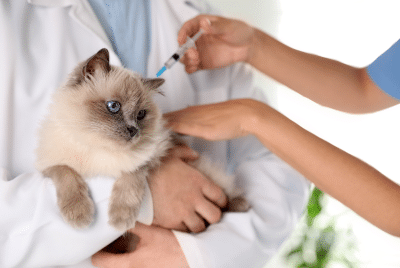
[ad_1]

The start of the New Year is a time to reflect on the past and look to the future. In this spirit, I’m going to use today’s blogpost to discuss new developments in veterinary medicine that will improve veterinarians’ ability to treat diseases, thus improving the quality of our pet’s lives.
New Therapeutic Monoclonal Antibodies
Monoclonal antibodies are laboratory-produced proteins that mimic the body’s immune response to a specific bacteria, virus, fungus or parasite. These molecules are an important tool for both human and animal doctors in treating diseases with generally low levels of side effects, thanks to their specificity. You may be familiar with the monoclonal antibodies used to treat COVID-19, for instance.
Monoclonal antibodies are not new in veterinary medicine—they have been available for about a decade—but a couple of important new ones have come on the market recently. Veterinarians now have a canine and a feline version of a monoclonal antibody to treat osteoarthritis, the most common form of arthritis diagnosed in pets. We also have a new monoclonal antibody to help treat parvovirus, an acute, potentially fatal viral disease typically found in puppies.
An added benefit of monoclonal antibodies is that these medications are administered by injection, often as infrequently as once a month. Both pet owners and veterinarians should be thrilled about fewer medications administered at home.
Medications to Facilitate Feline Vet Visits
The United States Food and Drug Administration recently added a new drug to the list of anti-anxiety medications available for feline patients who get anxious before a veterinary visit. Previously, there had only been one medication approved for this use—oral dexmedetomidine—however, veterinarians often use other, “off label” medications for the same purpose. These include medications familiar to many cat owners, such as gabapentin, trazodone, and alprazolam.
In 2024, veterinarians will also have pregabalin, in a liquid formulation, available for the specific veterinary use of alleviating feline anxiety in cats traveling to veterinary visits. These medications are a lifeline to cats and their owners, given that cats are medically underserved, which is often attributed to the difficulty of getting them into the carrier and their negative reaction to the veterinary healthcare team.
While it might take some trial and error to determine which of these medications works best for your anxious feline, the addition of another medication to the list improves our chances of finding one that works for your cat.
How Can I Get These Medications for My Pet?
All the medications outlined in this blogpost require a prescription. In addition, they are only available from veterinarians and not from your neighborhood drugstore. Administration of monoclonal antibodies requires an injection, and not all monoclonal antibodies are amenable to owner administration. Your veterinarian will know if these medications are right for your pet and can help your pet recover from serious illness or control pain stemming from arthritis. So be sure to talk to your veterinarian if you think your pet may benefit from one of the medications described here.
Here’s to a happy and healthy, 2024!
Tags:
alprazolam, antibodies, dexmedetomidine, feline anxiety, gabapentin, monoclonal antibodies, osteoarthritis, parvovirus, pregabalin, trazodone, veterinary medications, veterinary medicine,
[ad_2]
Source link

Leave a Reply